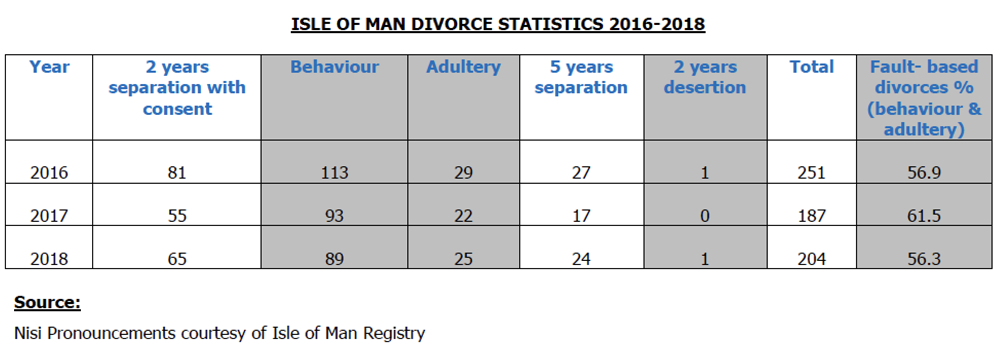Isle of Man residents are being invited to give their opinion on changing the divorce process on the Isle of Man.
The public consultation launched today on https://consult.gov.im/ seeks views on moving to a modern process that would enable a couple to apply jointly for a divorce or dissolution of civil partnership without having to state the reason why.
Significantly a couple could finalise their divorce in 26 weeks if the proposed legislation is approved. At present if both couples agree to divorce they must wait two years; where one party does not agree to divorce the separation period is five years. A divorce can be achieved more quickly where ‘fault’ is agreed – where one partner takes the blame for adultery or unreasonable behaviour.
Garff MHK Daphne Caine was given leave to introduce a Private Member’s Bill in October 2018 that sought ‘to amend the grounds for divorce, dissolution of civil partnerships and judicial separation; and for connected purposes’.
Mrs Caine said: ‘Divorce is acknowledged as one of the most stressful life events a person can experience, second only to the death of a loved one.
‘However, once couples have decided to divorce or dissolve their civil partnership, the process can be a lengthy one and have a long term negative impact on the couple and on children in particular. The purpose of bringing forward this Bill is to make divorcing a more honest, simpler and less stressful process.’
The public consultation reveals the island’s recent divorce statistics:

These show that in the past three years ‘fault’ based divorces – where the cause was given as adultery, desertion or unreasonable behaviour – have been around 56 to 61% – similar to England’s average of 60%.
However, in Scotland where no fault divorces are available, the figure is closer to six per cent for fault based divorces.
Family law advocate Hazel Smith commented: ‘Ethical family lawyers sign up to a code of practice which requires us to seek to minimise conflict during the divorce process. However the process itself, which in around 60% of cases means that one party blames the other for the breakdown, fans the flames of conflict. The study of 2017* reports that 62% of petitioners and 78% of respondents said using fault had made the process more bitter.
‘A total of 21% of respondents in a fault based divorce said that fault had made it harder to sort out arrangements for the children and 31% said it made it harder to come to a solution on finances. This flies in the face of modern, problem-solving family justice. The current law is over 50 years old. It has been criticised for decades in many reports and in Law Commission reviews. This new legislation is a real opportunity to minimise the consequences of relationship breakdown for all – adults, children, the court system, Treasury and society as a whole.’
The consultation remains open until 2 January 2020 at: https://consult.gov.im/private-members/no-fault-divorce-legislation/
*The Nuffield Foundation report referred to above, published October 2017 can be found here:
https://www.nuffieldfoundation.org/news/divorce-law-england-and-wales-increases-conflict-and-suffering-separating-couples-and-their-chi
Full report: https://www.nuffieldfoundation.org/sites/default/files/files/Finding_Fault_full_report_v_FINAL.pdf
Paper copies of the consultation are available on request and from the Welcome Centre in the Sea Terminal, Douglas.
